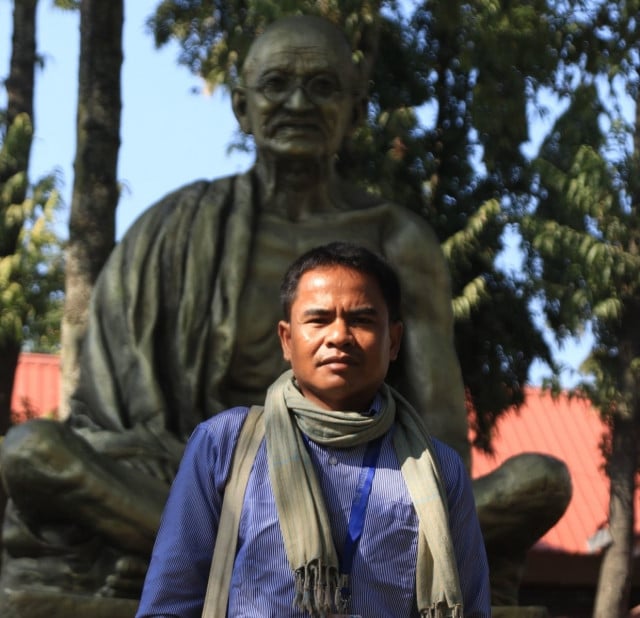Follow Heart or Market Demand? University Student Offer Advice to Newcomers

- By Rin Ousa
- November 24, 2023 11:55 AM
PHNOM PENH – A bachelor’s degree is a four-year journey in higher education that helps students land well-paying jobs and open up rewarding opportunities after graduation.
Ly Chhaingheng is a junior student majoring in Business Administration at the Paragon International University. He shares his thoughts on fresh high school graduates who are still vague about their ideal major, the importance of extracurricular activities, his opinion on Gap Year, and conveys essential messages to fresh graduate high schools before entering a four-year study curriculum.
Rin Ousa: Choosing the right major and university is a huge decision. Based on your experience, what are the main factors guiding you to choose your current major and university?
Ly Chhaingheng: I acknowledge that most students have one common concern: “I do not know what I like nor the university I want to pursue”. I have experienced it, and the process was confusing. However, I sorted out this by gathering all my small interests in one place, matching them with my degree, and analyzing them based on my preferences and weaknesses. Then, I realized I wanted to take a business degree at Paragon International University. Three main factors pushed me to take it. The first one was my interest in business operations. The second was my personality, as I love to meet new people in the form of business meetings and conferences. And, last but not least, I see a business degree as a good foundation for future start-ups, as this degree makes the connection between theory and real real business practice.
Rin Ousa: But some fresh high school graduates don’t know exactly what their interests or strengths are. Could you share some effective tips with them?
Ly Chhaingheng: Honestly, this was a tough situation for me as well. I was also in the process of discovering my interests back then. So, the first tip would be to ask yourself what you do not like. It is quite difficult to point out what you love sometimes, but it is easier to identify what you dislike. Once you do it, you will slowly figure out your interests. The second tip is to be involved in volunteering or competition. Doing so opens up more opportunities to test out what you like or may like and what you may be tired of doing. The third would be to talk to your friends. They can be a reflection of you, as they can positively see what you have inside.
Rin Ousa: What about taking a gap year, which is usually understood as a semester or a year of experiential learning after high school, to allow people to discover their interests?
Ly Chhaingheng: Personally, I would not suggest taking a gap year if students already know what major or university they want to pursue because they can both study and do extracurricular activities to discover more of their potential at the same time. However, if there is still hesitation, a gap year would be the best option to allow them to discover their interests, and goals to avoid the risk of changing majors.
Rin Ousa: Studying in two universities is quite common for Cambodian students, what do you think are the effective tips to manage time for those two universities effectively?
Ly Chhaingheng: I am in these shoes, and time management is crucial. First, I recommend having a checklist with priorities. Try to complete work or assignments based on their importance and urgency because work will pile up if we do not clear them one by one. The second tip would be not to have a fixed schedule for studying. Always change it according to the remaining time you have in order to make the most use of it. If there is a fixed one, you are restrained, and sometimes there is something even more important to complete. Lastly, move to another task if you are stuck with a particular task.
Rin Ousa: Do you think students should study two majors?
Ly Chhaingheng: It really depends, as there is not just black and white but it’s not grey either in this world. However, I would suggest taking one major only while allocating the remaining time to volunteer, join competitions, go for an internship, and get involved in other extracurricular activities. We learn the most from experiences, and we grow exponentially when we are exposed to a distinct environment.
Rin Ousa: Should students choose majors based on the market need or their love? Could you share your views on the students who land jobs that do not match their bachelor’s degree?
Ly Chhaingheng: I would say to consider both. Try to balance the two because the love for one major is good if students discover it; however, at the end of the day, people need to make a living. Every decision involves many key factors, as we cannot primarily base it on one reason for making a choice. In response to students who experience job mismatches, I think it is not strange anymore as long as they are motivated to do those jobs. Everything is flexible, and sometimes we just realize our love for a particular field during our time at university. That is why we go down different paths, and it is not the wrong thing to mention. Otherwise, office workers would not shift from office work to entrepreneurship; the same holds for students who have job mismatches.
Rin Ousa: From your point of view, should students be involved in extracurricular activities such as volunteering besides studying at the university? What do you think are the pros and cons?
Ly Chhaingheng: I definitely agree and encourage students to engage in those activities. It is the time when we learn how to work in teams of different ages, races, and beliefs, how to face real-life challenges and conflicts, how to communicate ideas, how to make effective decisions, and how to shape our potential and skills as a weapon for future opportunities. This is what we need in this era because hard skills only allow people to perform work, but soft skills allow people to sustain their positions. It just requires time and effort, and at some points, we have to trade off our studies to do those activities.
Rin Ousa: Do you think the current major and university determine the future careers?
Ly Chhaingheng: It is partially true, especially when we are just fresh graduates. A Bachelor's degree grants us the chance to set foot on the job relevant to our major, while a good university gives employers a sense of trust. However, in the long run, higher education will not be the determinant anymore. It will be our experience instead. We can always rotate to other fields and positions during our time at work if we have the ability to do so.
Rin Ousa: Do you have any messages for a fresh high school graduate before entering a four-year journey in higher education?
Ly Chhaingheng: To all fresh high school graduates, the university is just as beautiful as a high school if you tell yourself to enjoy it. Though some of you may feel desperate at first because of the transition; however, once you adapt to it, there will be no concern. If you choose the right major, the right university, and the right circle of friends, you will have a fruitful journey ahead.















